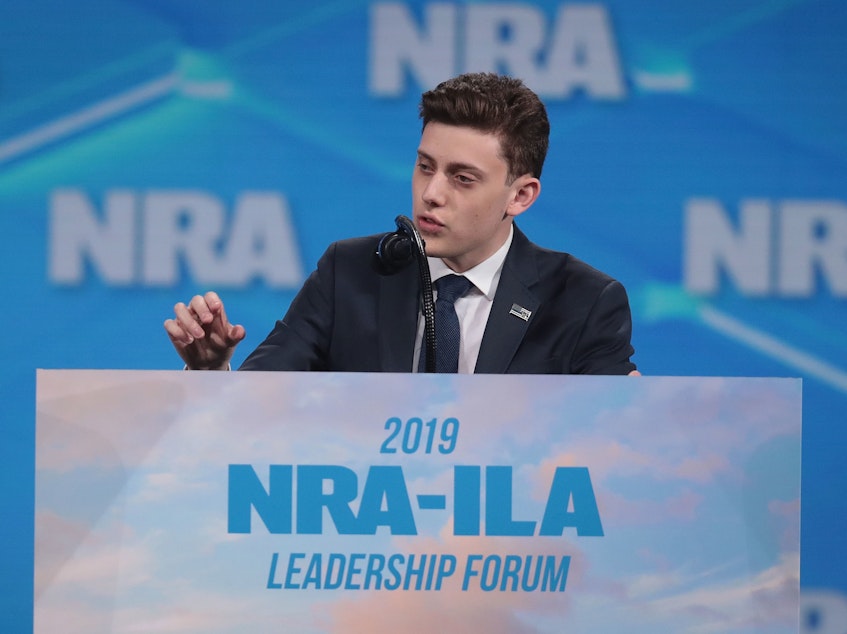Harvard Rescinds Offer To Parkland Survivor After Discovery Of Racist Comments

Kyle Kashuv, one of the survivors of the mass school shooting in Parkland, Fla., applied and was accepted into Harvard.
His acceptance, however, was rescinded after Harvard discovered that Kashuv, now 18, used racial slurs in texts, Skype conversations and Google documents when he was 16.
Here's why people are talking about Kashuv's case.
A Parkland survivor turned activist
Kashuv's name first came into the spotlight after he survived the mass shooting at Marjory Stoneman Douglas High School in February 2018. After the shooting, he became a nationally prominent gun-rights advocate while many of his surviving classmates instead organized to advocate for gun control.
Sponsored
What did Kashuv say?
On May 23, the Huffington Post published messages written by Kashuv that contained repeated uses of the n-word, and phrases like, "Kill all the f***ing Jews." According to the Huffington Post, the screenshots of the text, Skype conversations and Google documents were provided by classmates and a "former friend" of Kashuv.
Kashuv defended himself on Twitter for the comments, saying he used "callous and inflammatory language in an effort to be as extreme and as shocking as possible." He noted that he was 16 years old when he made the comments, and that the shooting changed his perspective.
"I see the world through different eyes and am embarrassed by the petty, flippant kid represented in those screenshots," he said on Twitter.
Harvard's Decision
Sponsored
According to a screenshot posted by Kashuv, William Fitzsimmons, the Dean of Admissions, asked him to provide a "full accounting" of his racist statements and a "written explanation of your actions" in a letter dated May 24.
Kashuv said on Twitter that he replied with an apology in which he stated, "I bore no racial animus," but that the context was "a group of adolescents trying to use the worst words and say the most insane things imaginable." But in a second letter dated June 3, Fitzsimmons said that the admissions committee had voted to rescind his admission, citing "maturity and moral character."
Colleges have long standing, if rarely used, policies of revoking admissions offers if a student is found to have engaged in questionable conduct. In fact, in 2017 a group of 10 students had their Harvard admissions revoked, also for offensive online posts.
Rachael Dane, a spokesperson for Harvard, told NPR that the university does not comment publicly on the admissions status of individual applicants, and added that the college reserves the right to withdraw an offer of admission under several conditions including, "If an admitted student engages or has engaged in behavior that brings into question their honesty, maturity or moral character."
Kashuv and Turning Point USA
Sponsored
Before these comments came to light, Kashuv was named an outreach director for the conservative campus group Turning Point USA. According to the Huffington Post, he stepped down when his former classmates threatened to make the messages public.
Turning Point USA has the slogan on its web site "Winning America's Culture War." The group maintains something called "Professor Watchlist," which lists the names and public profiles of hundreds of professors who have expressed personal views such as calling people "racist" on Twitter, or published feminist research. Many of these professors have been doxed — that is, had their identity or address exposed — and harassed, as NPR reported last year.
On stage at the Conservative Political Action Conference last March, President Trump publicly praised conservative activist Hayden Williams, who was punched while volunteering as a campus recruiter for Turning Point USA. The president brought Williams on stage when he talked about issuing an executive order to protect campus free speech.
Jessie Daniels, a professor of sociology at Hunter College who studies racists and white supremacists online, says that the Kashuv incident plays neatly into Turning Point USA's broader agenda.
"Part of what the far right is doing in every domain is trying to push that line of what's acceptable," Daniels said. "The N-word has become one of the skirmishes in this larger war."
Sponsored
"Harvard is pushing back and saying, nope, that's not acceptable behavior," Daniels said. [Copyright 2019 NPR]

